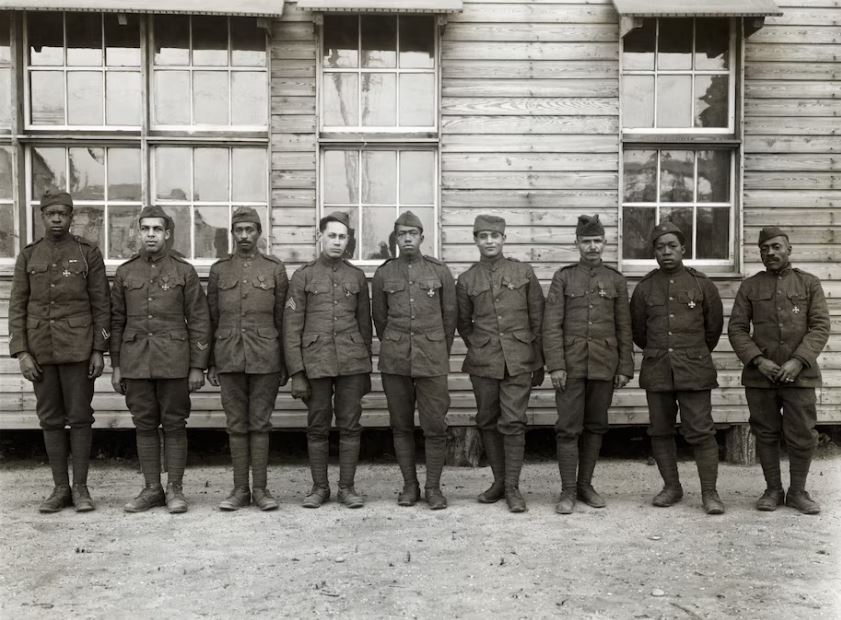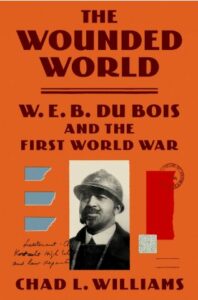The World War I editorial that W.E.B. Du Bois regretted for years
Published: 6 April 2023
By Vaughn Rasberry
via the Washington Post newspaper (DC) web site

Soldiers of the famed all-Black 369th Infantry Regiment in World War I. The original caption names them as sergeants, from left: J.H. Jones, R. Flower, C.E. Davis, J. White, J.H. Carmen, S.C. Farrell, B. Lucas, H.L. Printer and E.N. Barrington. (Bettmann Archive/Getty Images)
In ‘The Wounded World,’ Chad L. Williams recounts Du Bois’s disillusionment over the war and his struggle to publish a book about Black soldiers’ experiences
At the height of World War I, W.E.B. Du Bois published a controversial 1918 editorial, “Close Ranks,” in the NAACP publication the Crisis. In it, he counseled his readers to “forget our special grievances” with U.S. racial democracy and to throw their full weight behind the Allied war effort. The response was not positive. Readers were gobsmacked that Du Bois — the nation’s most distinguished Black scholar and public intellectual, as well as a pacifist — would direct them to join what many perceived as a “White man’s war” with no relevance to Black life.
Rather than use the war to leverage Black political interests, as some may have expected, Du Bois encouraged his readers to set aside their struggles in the name of patriotism and national unity.
Not without cause, observers wondered what the eminent author stood to gain from such a position (at the time, Du Bois was being considered for a captaincy in the U.S. military). Members of the Washington branch of the NAACP passed an unprecedented resolution denouncing the editorial. Disdainfully, Black labor activists A. Philip Randolph and Chandler Owen compared “Close Ranks” to Booker T. Washington’s “Atlanta Compromise” speech of 1895, in which Washington urged Black people to refrain from agitating for equality and, instead, to work hard, pursue vocational training and contribute to the building of the Southern agrarian economy. (“Nor should we permit our grievances to overshadow our opportunities,” Washington exhorted.) Du Bois’s hard-won credibility and prominence stood in jeopardy.
 He would spend the next two decades attempting, with mixed results, to account for this judgment and justify his war advocacy to his devoted readers — and to himself.
He would spend the next two decades attempting, with mixed results, to account for this judgment and justify his war advocacy to his devoted readers — and to himself.
Du Bois reckoned with his judgment and the tumult enshrouding it chiefly through writing. In “The Wounded World: W.E.B. Du Bois and the First World War,” historian Chad L. Williams narrates the impact of the war on Du Bois and his anguished effort to write a definitive history of Black participation in the Great War. In some measure, Du Bois sought to vindicate his war advocacy by telling the epic story of Black soldiers in the war — how they maintained dignity, composure and resolve in the face of unrelenting American racism; how they introduced jazz music to Europe; how they earned the respect and gratitude of the French military; how they created profound meaning out of the absurdity of battle.
Yet for reasons that become clear in Williams’s prodigiously researched and compulsively readable account, Du Bois was never able to complete this project, and “The Black Man and the Wounded World” remains his most substantial unpublished manuscript.
Du Bois was celebrated for his notion of “double consciousness” as a defining feature of Black American identity; he described this “peculiar sensation” as the “sense of always looking at one’s self through the eyes of others, of measuring one’s soul by the tape of a world that looks on in amused contempt and pity.” Du Bois viewed the war as an occasion to harmonize these dual and warring selves. If Black men (and he viewed the war as a test of, and opportunity for, Black manhood) proved their valor and acumen in Europe’s war theaters, then Whites would have no choice but to recognize the value and commitment of Black people to U.S. democracy and grant them full citizenship and respect.
That was his thinking, at least. In fact, the opposite ensued. Lynching escalated nationwide — in Chicago, East St. Louis, Houston and elsewhere. Segregation continued unabated. With their pride boosted, Black veterans became targets of vicious racists who were determined to put these soldiers back in their place.
Read the entire article on the Washington Post web site.
External Web Site Notice: This page contains information directly presented from an external source. The terms and conditions of this page may not be the same as those of this website. Click here to read the full disclaimer notice for external web sites. Thank you.



